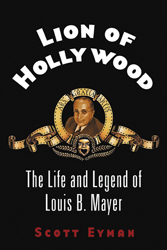(Simon & Schuster, 596 pages, $35)
By Scott Eyman

Any book about the life of Louis B. Mayer can't escape being a history of the place that took the studio system to its purest, and most infuriating, heights. No studio was more favorable to producers (the Irving Thalbergs) over directors (the Clarence Browns) than that glitter factory Metro-Goldwyn-Mayer, whose heyday is vividly described in Scott Eyman's rich biography of its outsized mogul. MGM was notoriously a studio where the swift, economical brilliance of a W.S. "Woody" Van Dyke II (one of the 13 founders of the DGA) – a director who could wrap an A picture in only a few weeks – was infinitely preferred to the wild, untamed vision of an Erich Von Stroheim. "It's clear that the rise of the auteur theory was a reaction against the Mayer-Thalberg ethos," writes Eyman, who informs us that Mayer would tell new directors at the studio, "I consider the director is on the set to communicate what I expect of my actors." Producers rarely changed on a project, whereas five different studio directors might be used to bring a film to completion. Eyman makes a well-supported case suggesting that MGM both benefited and was hamstrung by its leader's sentimental immigrant vision of an America that was beautiful, shiny, respectful to mothers, and blind to humanity's baser nature or more disturbing sociological problems. A movie like Fritz Lang's 1936 lynching drama
Fury, for instance, got made only because Mayer wanted to prove that it would "go on its ass" even with the same marketing push as a
Romeo and Juliet. (It didn't, incidentally.) Eyman recounts how Elia Kazan came to the studio to make
Sea of Grass only to discover that the second unit footage had been completed, the costumes and sets designed, the script finalized and his services deemed unnecessary for editing. When Kazan questioned whether the wardrobe accurately reflected rural life, he was told, "Actually, this picture takes place in Metro-Goldwyn-Mayerland."
Review written by Robert Abele.